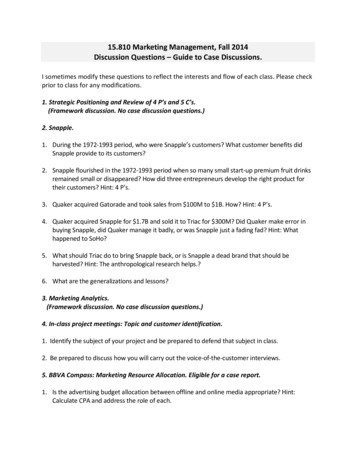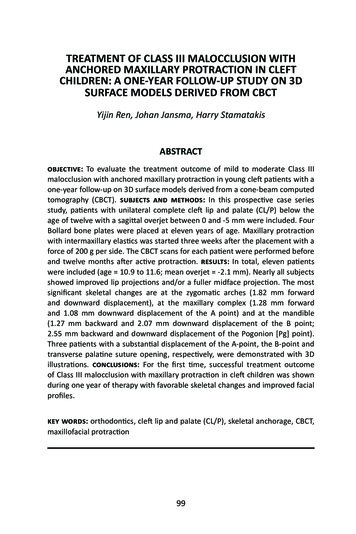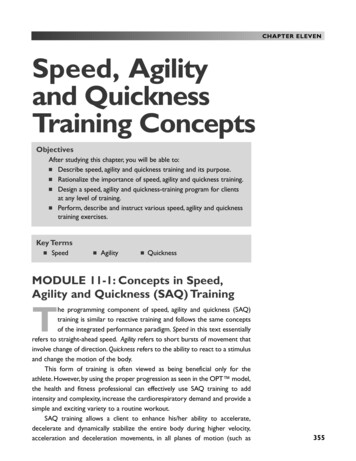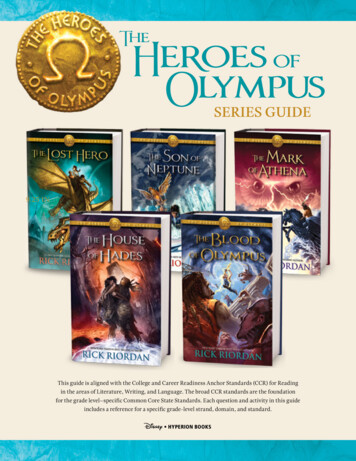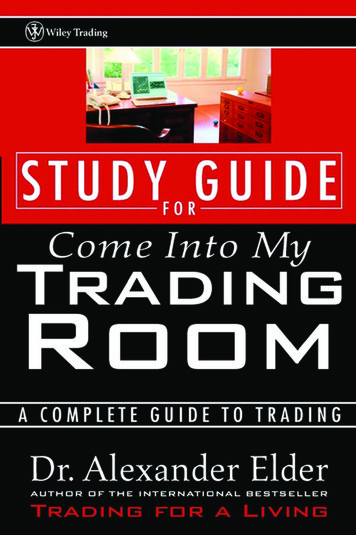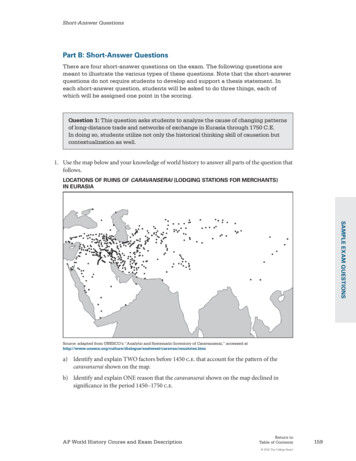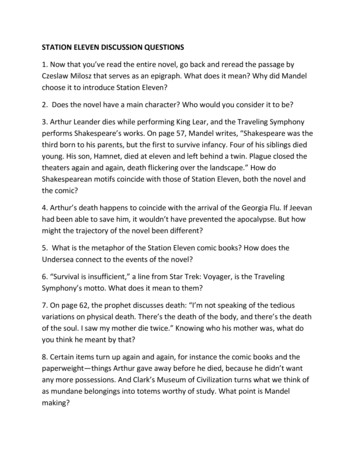
Transcription
STATION ELEVEN DISCUSSION QUESTIONS1. Now that you’ve read the entire novel, go back and reread the passage byCzeslaw Milosz that serves as an epigraph. What does it mean? Why did Mandelchoose it to introduce Station Eleven?2. Does the novel have a main character? Who would you consider it to be?3. Arthur Leander dies while performing King Lear, and the Traveling Symphonyperforms Shakespeare’s works. On page 57, Mandel writes, “Shakespeare was thethird born to his parents, but the first to survive infancy. Four of his siblings diedyoung. His son, Hamnet, died at eleven and left behind a twin. Plague closed thetheaters again and again, death flickering over the landscape.” How doShakespearean motifs coincide with those of Station Eleven, both the novel andthe comic?4. Arthur’s death happens to coincide with the arrival of the Georgia Flu. If Jeevanhad been able to save him, it wouldn’t have prevented the apocalypse. But howmight the trajectory of the novel been different?5. What is the metaphor of the Station Eleven comic books? How does theUndersea connect to the events of the novel?6. “Survival is insufficient,” a line from Star Trek: Voyager, is the TravelingSymphony’s motto. What does it mean to them?7. On page 62, the prophet discusses death: “I’m not speaking of the tediousvariations on physical death. There’s the death of the body, and there’s the deathof the soul. I saw my mother die twice.” Knowing who his mother was, what doyou think he meant by that?8. Certain items turn up again and again, for instance the comic books and thepaperweight—things Arthur gave away before he died, because he didn’t wantany more possessions. And Clark’s Museum of Civilization turns what we think ofas mundane belongings into totems worthy of study. What point is Mandelmaking?
9. On a related note, some characters—like Clark—believe in preserving andteaching about the time before the flu. But in Kirsten’s interview with FrançoisDiallo, we learn that there are entire towns that prefer not to: “We went to aplace once where the children didn’t know the world had ever been different . . . ”(page 115). What are the benefits of remembering, and of not remembering?10. What do you think happened during the year Kirsten can’t remember?11. In a letter to his childhood friend, Arthur writes that he’s been thinking abouta quote from Yeats, “Love is like the lion’s tooth.” (page 158). What does thismean, and why is he thinking about it?12. How does the impending publication of those letters affect Arthur?13. On page 206, Arthur remembers Miranda saying “I regret nothing,” and usesthat to deepen his understanding of Lear, “a man who regrets everything,” as wellas his own life. How do his regrets fit into the larger scope of the novel? Otherthan Miranda, are there other characters that refuse to regret?14. Throughout the novel, those who were alive during the time before the fluremember specific things about those days: the ease of electricity, the taste of anorange. In their place, what do you think you’d remember most?15. What do you imagine the Traveling Symphony will find when they reach thebrightly lit town to the south?16. The novel ends with Clark, remembering the dinner party and imagining thatsomewhere in the world, ships are sailing. Why did Mandel choose to end thenovel with him?Source: ion-eleven/
INTERVIEW WITH EMILY ST. JOHN MANDEL, 2014 NATIONAL BOOK AWARD FINALIST,FICTIONSTATION ELEVENLincoln Michel: Let me start by congratulating you on being a well-deserved National Book Award FictionFinalist! Station Eleven is a about a Shakespearean theater troupe traveling through a post-apocalyptic NorthAmerica. However, you’ve said that your initial idea was about a theater troupe in contemporary Canada. Whatmade you add in the end of the world?Emily St. John Mandel: Thank you for the congratulations! I added in the end of the world because I wantedto write a love letter to this extraordinary world in which we live. There are a great many things about this worldthat are of course completely appalling, but we're surrounded by a level of technology and infrastructure that atany other point in human history would have been considered absolutely miraculous. We live and work inrooms lit up by electricity, we cross continents and oceans in hours instead of days or months, our trash istaken away when we leave it at the curb, speaking to someone on the far side of the world is as simple asentering a sequence of numbers into a handheld device. These are remarkable things that we too easily takefor granted. One way to write about the modern world was to consider its absence, which is why I set partsof Station Eleven in a post-apocalyptic landscape. I thought of the book as a love letter written in the form of arequiem.LM: I’ve read that you spent many hours on survivalist message boards while writing the novel. Whatkind of research did you have to do to create your imagined future?ESJM: I didn’t do an enormous amount of research into the future. I did more research into the past: the life ofShakespeare and the history of pandemics. For the future bits, I just wanted to make sure I didn’t missanything terribly obvious that would jolt readers out of the story. I did spend some time reading throughsurvivalist message boards—for the record, I cannot recommend this activity—in order to get a betterunderstanding of what it actually means to live without the modern world, to make your own soap and such,and the rest of it was a matter of thinking about every aspect of my characters’ lives twenty years after asocietal collapse, and then googling things like the weight of an extended-bed pickup truck with the engineremoved, how many horses would be needed to safely pull said vehicle and how large the wheels would needto be, the use of horse tail hair for violin bows, etc.LM: The New York Times recently published an article titled “The World Is Ending, and ReadersCouldn’t Be Happier” about Station Eleven and other recent post-apocalyptic novels by David Mitchell,Edan Lepucki, Benjamin Percy, and others. Do you feel as if your novel is part of a movement? Or, asan author, is that something that you leave to the critics to think about?ESJM: When I started writing Station Eleven, there really weren’t a lot of literary post-apocalyptic novels outthere. I didn’t feel like I was part of a movement as I was writing it. I was locked up in the world of the novel, theway one always is when writing one of these things, which is to say that writing Station Eleven felt as solitaryas writing a novel always feels. It was a private world into which I escaped when I wasn’t at my day job.
By the time I finished the book, there were so many post-apocalyptic novels out there that I really worried thatno one would want to publish it. I had visions of editors reading my agent’s pitch letter and rolling their eyes,like “Great, another post-apocalyptic novel, just what the world needs.” But now, with the book out in the world,on the one hand I can’t deny that it’s part of a large group of post-apocalyptic novels that have come along atmore or less the same time.On the other hand, what novel isn’t part of a larger category? I haven't read Ben Percy's book yet, but when Iconsider Station Eleven alongside The Bone Clocks and California, I’m not sure that the books that end uptogether in these categories really have much in common. California is a close portrait of a marriage. I'm only afew chapters into The Bone Clocks but it seems like something quite different from either California or StationEleven, and it seems to me that none of these books are particularly reminiscent of, say, HowardJacobson's J or Colson Whitehead's Zone One, to cite a couple other recent examples.LM: Station Eleven paints a much more hopeful picture of humanity than many other post-apocalypticworks such as The Road or The Walking Dead. How conscious were you of trying to counter thenarrative that humans must descend into pure violence, horror, and brutality when disaster strikes?ESJM: It’s not that I don’t think that humans would descend into pure violence and horror, it’s more that I thinkwe wouldn’t stay there forever, because mayhem isn’t a particularly sustainable way of life over the long haul. Ido touch briefly on the horror in Station Eleven, but I feel that that territory of post-apocalyptic horror has beenvery thoroughly covered by other writers, and I wasn’t interested in spending too much time there. For me, itwas more interesting to write about what comes next, which is why the post-apocalyptic sections are set twentyyears after the collapse. After the initial nightmare of societal collapse, what does the world look like twentyyears down the line, when a new culture has begun to emerge? That was what I found myself most interestedin writing about.LM: In addition to presenting a much calmer and more ruminative portrait of post-apocalypselife, Station Eleven foregrounds the importance of art to humanity. The novel follows a traveling theaterand symphony that perform Shakespeare and play Beethoven because “people want what was best ofthe world.” What role does art play for humans in the midst of catastrophe?ESJM: I think art reminds us of civilization, with all that that implies. You could perhaps say that it reminds usthat we’re human. We have an instinct for art, even in the midst of catastrophe, and you see that in any of themost desperate places on Earth: people play music in refugee camps and put on plays in war zones.LM: Shakespeare frequently employs plays within in a play, so it is fitting that Station Eleven has anovel within a novel. Specifically, a science fiction graphic novel called Dr. Eleven. Have you everthought about working in that medium?ESJM: God, I would love to. I love that form. I can’t draw, but I think it would be fun to collaborate with agraphic artist on a comic book someday. Or actually, given my schedule these days, maybe a graphic artistcould license the rights and then just go off and put the comic book together and surprise me with it when it’sdone.
LM: This mixing of supposedly “high” (Shakespeare) and supposedly “low” (comics) art occursseveral times in the novel. For example, Kirsten gets ribbed by her fellow Shakespearean actors forhaving a tattoo that says “survival is insufficient”—a line from a Star Trek: Voyager episode. Could youspeak a little about how these different elements play off each other in the novel?ESJM: An interesting thing that people often forget about Shakespeare was that in his day, his works werepopular entertainment. I think I was so immersed in that idea as I was writing the novel that it didn't really occurto me that I was borrowing from high vs. low culture when I used Shakespeare and Star Trek. I suppose I wasalso immersed in the world of the book, where life is so cleanly divided into before the collapse and after thecollapse; Shakespeare and Star Trek just seemed like two elements of the culture of "before." I took that linefrom Star Trek, “survival is insufficient,” because it seemed to me to be an elegant expression of a sentimentthat I believe to be true.LM: One character the troupe encounters is trying to connect to the internet with a bicycle-poweredcomputer. In the age of Twitter, Facebook, and smartphones, it sometimes feels impossible that theinternet could stop existing—even though, in fact, it has only been around for about two decades, thesame span of time since it disappeared for your characters. If the internet disappeared tomorrow, whatwould you miss the most and what would you miss the least?ESJM: I would miss the instant availability of information. It’s wonderful, isn’t it, that we can look up almostanything we can think of at any time? As for what I’d miss the least, I’d have to say social media. I’ve met someof my closest friends through social media, so I feel a little hypocritical saying that I wouldn’t miss it, but, well,at this point in my life I really wouldn’t.The most terrible thing about the internet is how distracted it’s made us. In the last few years it’s become muchharder to walk down the sidewalk in New York, because a fairly large percentage of the people walking towardyou are mesmerized by their phones. I find those people kind of unsettling. They’re here but also somewhereelse, which is to say that they’re nowhere in particular. There’s something zombie-like about them. If theinternet were to disappear, we’d return to being more or less in the same world when we walked down thestreet.LM: Your three previous novels have been labeled “literary mysteries” or “literary noir.” How differentdid writing the post-apocalyptic Station Eleven feel? Were you consciously working in that tradition, oris the genre label an afterthought?ESJM: When I started Station Eleven I was conscious of wanting to write a book that was different from myprevious work, but I never set out to write mysteries or noir. My goal has always been to write literary fiction,but with the strongest possible narrative drive. My ideal of the perfect novel is Donna Tartt’s The SecretHistory, which is beautifully written and also a page-turner.I was actually surprised when my first novel was labeled as noir, and it became apparent very quickly thatthese genre labels are really just tags applied to a book for marketing purposes. Writing Station Eleven felt
very similar to writing my previous three novels. When I wrote Station Eleven I was trying to go further in everysense, in literary quality and scale and ambition, but that was true of my second and third books too.LM: And what similarities do you see between this novel and your previous ones?ESJM: All four novels share some of the same concerns. I’ve always been interested in writing about memory,and in what it means to live honorably in a damaged world, and I think it’s fair to say that these preoccupationsappear in each book. Travel and music also seem to appear over and over again.LM: What books, post-apocalyptic or otherwise, inspired you while writing Station Eleven?ESJM: Oddly, I don’t think I can point to any books that were specifically inspiring while I was writing the book.But I saw a play during that time that influenced Station Eleven a great deal: Being Shakespeare, amesmerizing one-man play by Jonathan Bate that had a brief run at BAM when I was about a hundred and fiftypages into the first draft of Station Eleven. That was the first time I encountered the idea of Shakespeare as aman whose life was heavily marked by the episodes of bubonic plague that swept over England again andagain in that era.LM: While the novel takes place in the ruins of our world, you’ve said that you consider the book “alove letter to the modern world.” If you were building your own Museum of Civilization [In StationEleven, the Museum of Civilization is a collection of relics from the pre-pandemic world, e.g. passportsand mobile phones.] what would you include?ESJM: I’d include a globe. What I found myself thinking about as I wrote this book is how local our lives wouldbecome, if telecommunications and the possibility of high-speed travel were to fall away. You would likelynever again see friends and family who happen to live in other countries. You wouldn’t know what washappening a hundred miles away, let alone on the other side of the Atlantic. I think a globe would be helpful inretaining some sense of the scale of the world.Source: http://www.nationalbook.org/nba2014 f mandel interv.html#.Va68MvlVhBc
Station Eleven review – Emily St John Mandel’srich post-apocalyptic taleA handful of survivors of a deadly flu epidemic attempt to rebuild civilisation in Emily StJohn Mandel’s impressive fourth novel by Natasha TripneyWhat will survive of us when the world stops? What will we cling to if life as we know itends? There are a lot of potent ideas at play in Emily St John Mandel’s fourth novel. A fluvirus has wiped out most of the world’s population. Those who survive are plunged into aworld without antibiotics or internet or air travel. What marks this apart from so manysimilar apocalyptic narratives is its scope. It’s one of the most considered and ideas-richtakes on the genre. Mandel does describe the devastation of the initial outbreak, but onlyin a fragmentary fashion, a shard here, a shard there. The bulk of the narrative slides backand forth between the world before and a period two decades after the crisis, when thoseleft behind have had time to adapt and are attempting to begin again.The survivors have formed settlements, which are visited by a travelling symphonyperforming the works of Shakespeare. The performers use a line from Star Trek – “survivalis insufficient” – as their motto and there is a sense that all texts from the pre-flu worldhave become artefacts, relics of a lost civilisation, to be treasured and studied andcelebrated. The title comes from a graphic novel that has taken on almost talismanicproperties in Year Twenty. In this way Mandel covers some of the same thematic groundas Anne Washburn’s “post-electric” play, Mr Burns, in which a similar group of a survivorsrecreate episodes of The Simpsons, but her approach is less clinical and more hopeful.The novel’s cast of characters is large and some of them are more fleshed out than others,but the most memorable include Jeevan, a one-time journalist turned trainee paramedic,and Kirsten, a performer with the symphony who was a child when the deadly virus struck;some things she remembers vividly, others she has let herself forget.You could argue that the flashbacks to the life of Arthur Leander, a famous actor who died(of natural causes) on the day the flu hit, are too numerous and detract from the narrativemomentum, but the novel’s imaginative breadth is considerable; it’s full of serrated detailsabout all the things, small and large, lost to the world, and yet it is also consoling in itsbelief that there are some things that will continue, some things that will remain.Source: nedpost-apocalyptic
INTERVIEW WITH EMILY ST. JOHN MANDEL, 2014 NATIONAL BOOK AWARD FINALIST, FICTION STATION ELEVEN Lincoln Michel: Let me start by congratulating you on being a well-deserved National Book Award Fiction Finalist! Station Eleven is a about a Shakespearean theater t
